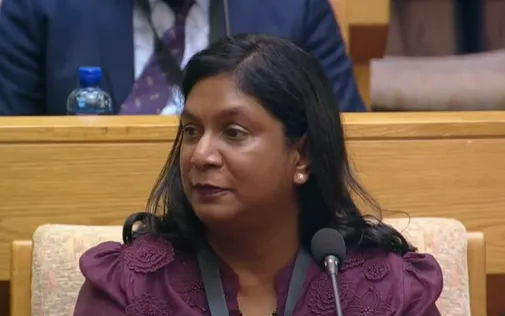
Corruption Watchdog Chief Rejects Claims of Sabotaged Investigations by IDAC in 'Big Five' Syndicate Probe
Image: X
Advocate Andrea Johnson, Head of the Investigating Directorate Against Corruption (IDAC), firmly rejected allegations that IDAC intentionally sabotaged criminal investigations.
Her testimony before the Parliamentary Ad Hoc Committee investigating criminal infiltration, corruption, and political interference in South Africa’s justice system comes amid a high-profile probe into the influence of a suspected crime syndicate known as the “Big Five.”
The committee, chaired by Soviet Lekganyane, convened hearings starting October 7 following KwaZulu-Natal Police Commissioner Lieutenant General Nhlanhla Mkhwanazi’s explosive July 6 claims.
Mkhwanazi alleged that the syndicate had deeply infiltrated law enforcement and intelligence structures, severely compromising the integrity of investigations, especially those involving politically motivated killings.
Central to the inquiry is the contentious December 31, 2024, decision by suspended Police Minister Senzo Mchunu to disband the Political Killings Task Team (PKTT), which Mkhwanazi warned would undermine efforts to hold syndicate members accountable.
Johnson faced pointed questions about allegations that IDAC delayed criminal investigations and obstructed prosecutions.
She denied any institutional wrongdoing and said, “The allegations that IDAC intentionally delays investigations are unfounded.”
One significant subject was the arrest earlier this year of Crime Intelligence head Lieutenant General Dumisani Khumalo, an incident Mkhwanazi tied to alleged IDAC interference.
Johnson declined to implicate IDAC in any misconduct, emphasising that all actions taken were within the law and procedural frameworks.
A focal point of Johnson’s defence was IDAC’s oversight and accountability mechanisms.
Evidence leader Norman Arendse SC questioned her about whether there was oversight at IDAC.
Johnson explained that IDAC operated without direct judicial oversight, confirming an allegation previously made by former Police Minister Bheki Cele.
ANC MP Xola Nqola probed: “IDAC was formed in 2019; oversight came under discussion in 2024, and the inspecting judge was only appointed in October. Where was IDAC reporting prior?”
Johnson replied, “Before October 2024, oversight was internally managed through labour provisions and disciplinary processes within the National Prosecuting Authority (NPA). The justice department is responsible for appointing the oversight judge, but I have not yet met this person.”
EFF leader Julius Malema added, “Oversight is necessary to prevent abuse of power. Why was there no proper oversight for so many years?”
Johnson acknowledged the gap, stating, “While oversight personnel were appointed recently, previously accountability functioned through labour dispute resolution, ethics committees, and internal disciplinary courts. We recognised the need to strengthen formal oversight.”
Johnson also outlined her professional interactions with Mkhwanazi, whom she described as “a committed individual.”
She recalled their collaboration when IDAC investigators worked in KwaZulu-Natal province, notifying police and prosecutors about witnesses relevant to some instances. Their last direct communication was in June 2025.
A key subject of contention was IDAC’s senior investigator, Brian Padayachee.
Mkhwanazi’s testimony suggested internal disagreements and factionalism within IDAC, with some insinuating that Padayachee’s access and role compromised investigations.
“Padayachee is a trained detective who completed the necessary detective course and has led multiple investigations within both the South African Police Service and IDAC since 2021. Claims that he lacked experience or qualification are categorically untrue,” Johnson defended Padayachee.
She explained that restrictions placed on Padayachee’s access to Crime Intelligence documents were instituted to protect vulnerable witnesses who reported intimidation.
“These controls were not intended to obstruct investigations but to prevent witness tampering,” Johnson said.
Regarding procedural matters, she detailed that any access to Crime Intelligence information required strict adherence to protocols, including issuing subpoenas to the national police commissioner.
She said that Padayachee and Mkhwanazi maintained open communication about operations within KwaZulu-Natal, with meetings and WhatsApp exchanges facilitating cooperation.
“IDAC investigators informed the provincial police commissioner when they needed to interact with police witnesses or access sensitive materials.”
“Mkhwanazi was willing to assist and facilitate our work,” Johnson noted, expressing uncertainty about where alleged breakdowns occurred.
Mkhwanazi has previously detailed factional conflicts and internal struggles within IDAC during the Madlanga Commission of Inquiry, further complicating the public’s understanding of the institution’s functionality.
As hearings continue through Thursday and Friday, the committee’s mandate remains focused on unveiling the full depth of criminal infiltration and corruption within South Africa’s justice system, ensuring accountability and institutional integrity moving forward.
IOL Politics
Related Topics: